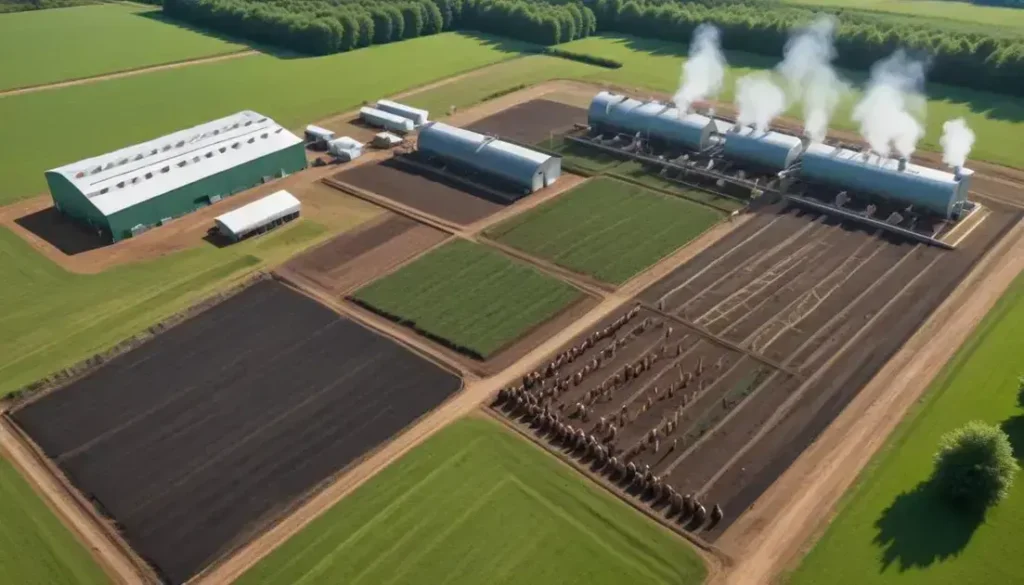The UK-India trade agreement enhances market access for Australian exporters by reducing trade barriers, promoting sustainability, and creating opportunities in renewable energy and technology sectors.
The recent **trade deal** between the UK and India stands to reshape the landscape for businesses involved in renewable energy. This agreement opens doors for collaboration and export opportunities, making it essential for Australian stakeholders to stay informed.
Introduction to the UK-India trade agreement
The UK-India trade agreement represents a significant milestone in international relations, fostering economic ties between these two nations. By reducing tariffs and promoting trade, this deal aims to enhance market access for goods and services, thereby benefiting both economies. The agreement covers a wide array of sectors, including technology, agriculture, and renewable energy, emphasizing sustainable development.
Impact on Australian Businesses: Australian businesses stand to gain from this agreement as they look to expand their footprint in the Indian subcontinent. This trade deal offers new opportunities for exporters to tap into one of the fastest-growing markets in the world. The focus on green technology and sustainable practices aligns with Australia’s strengths, especially in renewable energy resources.
Moreover, the deal encourages innovation and collaboration between the UK, India, and Australia. As companies explore business partnerships, they have the opportunity to leverage each other’s expertise. Australian exporters can benefit from India’s growing demand for high-quality products, further cementing Australia’s position as a reliable trading partner.
Key features of the trade deal
The key features of the trade deal between the UK and India highlight a commitment to enhancing bilateral trade. The agreement aims to lower tariffs on a wide range of goods, making it easier for businesses to access each other’s markets. By doing so, it fosters a more competitive trading environment.
One of the most significant aspects is the focus on sustainable practices. Both countries are prioritising green technology and renewable energy initiatives. This shift supports global environmental goals and encourages investments in innovations that reduce carbon footprints.
The trade deal also includes provisions for improved regulatory cooperation. This means that businesses can expect streamlined processes when operating internationally, reducing red tape and fostering trade efficiency. The alignment of technical standards will facilitate smoother imports and exports.
Moreover, the agreement promotes collaboration in research and development. This partnership can lead to breakthroughs in various sectors, including health, technology, and agriculture. It sets the stage for innovative approaches that benefit both economies, driving growth and sustainability.
By addressing trade barriers and fostering cooperation, the UK-India trade deal paves the way for a prosperous future. Businesses on both sides can leverage these opportunities to expand and thrive in the global market.
Impact on renewable energy sectors
The impact on renewable energy sectors from the UK-India trade deal is poised to be transformative. This agreement encourages investment in green technologies, facilitating a shift towards more sustainable energy solutions. Both nations are prioritising initiatives that align with global climate goals, presenting a unique opportunity for growth.
With reduced tariffs on renewable energy equipment, businesses in Australia will find it easier to export their innovations to India. This market access will boost collaborations in solar and wind energy projects, contributing to a cleaner energy landscape. The demand for renewable resources is expected to surge, opening doors for Australian companies to showcase their expertise.
In addition, the trade deal promotes joint research and development ventures. By partnering on sustainable energy solutions, the UK and India can leverage their respective strengths, fostering innovation that benefits both countries. Australian businesses could also engage in these collaborations, expanding their influence in the renewable sector.
Moreover, the agreement aims to enhance regulatory frameworks that support sustainable practices. This alignment can help streamline processes for companies looking to enter new markets and create a more stable investment environment. The synergy between the UK, India, and Australia could thus accelerate the transition to a sustainable future.
Opportunities for Australian exporters
The UK-India trade deal creates significant opportunities for Australian exporters looking to expand their markets. With reduced tariffs and more streamlined regulations, Australian companies can introduce their goods and services to a rapidly growing economy. This trade agreement provides a gateway for businesses, particularly in sectors like agriculture, technology, and renewable energy.
One major advantage lies in the demand for high-quality agricultural products. Indian consumers are increasingly seeking premium goods, presenting Australian farmers with an opportunity to export beef, dairy, and specialty crops. The trade deal not only facilitates access but also positions Australian exporters as leaders in providing sustainable, high-quality produce.
In the technology sector, Australian firms can offer innovative solutions tailored to India’s unique challenges. From software development to clean energy technologies, the trade agreement encourages partnerships that foster knowledge sharing and collaboration between nations. This strategic alignment could enhance Australia’s reputation as a hub for technological advancements.
Moreover, Australian businesses can benefit from increased investment in infrastructure projects in India. As the country ramps up its infrastructure development, there is a growing demand for engineering services and construction materials, providing further avenues for Australian exporters to explore.
Collaboration in green technology
Collaboration in green technology is a pivotal aspect of the UK-India trade deal, fostering innovation and sustainable practices between these nations. By joining forces, both countries aim to address pressing environmental challenges while promoting economic growth. This partnership focuses on sharing knowledge and expertise in areas such as renewable energy, energy efficiency, and sustainable agriculture.
Australian businesses are uniquely positioned to contribute to this collaboration. With a strong track record in green technology, Australia can offer valuable insights into developing cutting-edge solutions. Initiatives may include advancements in solar power, wind energy, and battery storage, which are crucial for transitioning to a low-carbon economy.
Furthermore, this collaboration encourages research and development partnerships, enabling companies to leverage each other’s strengths. By working together, stakeholders can accelerate the adoption of innovative technologies that reduce emissions and enhance sustainability. The exchange of technical know-how will facilitate the implementation of best practices tailored to local contexts.
In addition, these efforts are expected to create job opportunities in both countries as new industries emerge. With increased investment in green technologies, Australia and India can drive sustainable development, positioning themselves as leaders in the global clean energy market. This collaboration not only benefits the environment but also strengthens the economic ties between the two nations.
Growth prospects for UK companies in India
The growth prospects for UK companies in India have never been more promising. With the signing of the recent trade deal, UK businesses are presented with a unique opportunity to tap into India’s burgeoning market. As the world’s sixth-largest economy, India offers a diverse consumer base eager for innovative products and services.
One primary driver of growth is India’s rapidly expanding middle class, which is increasingly demanding quality goods. UK companies can leverage their reputations for high standards in areas such as manufacturing, technology, and consumer goods. The trade deal reduces tariffs, making it more cost-effective for UK businesses to enter and sustain operations in this vibrant market.
Furthermore, sectors such as technology and green energy are set to witness significant investment. UK firms, especially those involved in fintech, education, and renewable energy, can anticipate high demand for their expertise as India accelerates its digital transformation and sustainable development initiatives.
The UK’s commitment to fostering bilateral trade relations also means better support structures for businesses looking to invest. This can include access to funding, strategic partnerships, and streamlined regulatory processes, enhancing the overall business environment. UK companies are therefore well-positioned to seize this moment and expand their footprint in India, contributing to mutual economic growth.
India’s market potential for sustainable solutions
India’s market potential for sustainable solutions is vast and expanding rapidly. As the country grapples with climate change and environmental degradation, there is a growing demand for innovative approaches to sustainability. This shift opens numerous opportunities for businesses that can provide eco-friendly products and services.
The Indian government is actively promoting sustainability through various initiatives and policies aimed at reducing carbon emissions. Programs focusing on renewable energy sources, waste management, and water conservation are gaining momentum. As a result, companies that specialise in solar energy, biofuels, or waste recycling can tap into this burgeoning market effectively.
Additionally, the urbanisation of Indian cities presents a unique challenge and opportunity. With millions migrating to urban areas, there is an urgent need for sustainable urban planning solutions. This includes eco-friendly construction practices, smart city technologies, and efficient public transport systems. Australian businesses with expertise in these areas can take advantage of India’s commitment to sustainable development.
Investing in these sectors not only supports India’s environmental goals but also aligns with global sustainability efforts. As consumers increasingly prefer environmentally responsible products, businesses that adapt to these market preferences will thrive. The intersection of India’s growth and sustainability presents a compelling landscape for innovation and investment in sustainable solutions.
UK’s clean energy transition
The UK’s clean energy transition is a pivotal movement towards a sustainable future. As the country seeks to reduce its carbon footprint, it has made significant strides in shifting from fossil fuels to renewable energy sources. This transition is driven by ambitious government policies aimed at achieving net-zero emissions by 2050.
One of the core components of this transition is the increased investment in renewable energy technologies, such as wind, solar, and biomass. The UK has become a global leader in offshore wind energy, boasting some of the largest offshore wind farms in the world. This not only provides green electricity but also creates jobs and stimulates economic growth.
In addition to renewable generation, the UK is focusing on improving energy efficiency. Initiatives aimed at retrofitting buildings and enhancing public transportation are crucial for reducing energy consumption. Smart technologies are also being integrated to optimise energy use across various sectors.
The shift towards a clean energy economy also opens up opportunities for international collaboration. Partnerships with countries like India can lead to shared innovations and technological advancements in clean energy, benefiting both nations. The UK’s commitment to this transition illustrates its determination to lead in global sustainability efforts, ensuring a cleaner and greener future for generations to come.
The significance of technology in sustainability
The significance of technology in sustainability cannot be overstated. As the world faces escalating environmental challenges, innovative technologies are proving essential for driving sustainable practices across various sectors. Advances in technology enable businesses and individuals to reduce their carbon footprint, optimise resource usage, and develop sustainable solutions.
For instance, renewable energy technologies play a pivotal role in transitioning towards a low-carbon economy. Innovations in solar and wind energy have significantly decreased costs and improved efficiency, making clean energy more accessible. Additionally, energy storage solutions are crucial for managing renewable energy supply and ensuring reliability.
Furthermore, digital technologies are enhancing sustainability efforts through smart management systems. Internet of Things (IoT) devices allow for real-time monitoring and optimisation of energy use in buildings and industries. This data-driven approach enables more informed decisions that lead to reduced waste and improved efficiency.
Technology also facilitates the development of sustainable products and materials. Advances in recycling and waste management technologies are enabling a circular economy, where materials are reused and repurposed, minimising landfill waste. Overall, embracing innovative technologies is critical for fostering a sustainable future, enabling not only environmental preservation but also economic growth and social well-being.
Trade barriers and market access
Trade barriers and market access are critical components of international trade dynamics. They can significantly impact the ability of businesses to enter new markets and achieve competitive advantage. Barriers such as tariffs, quotas, and complex regulations often hinder the movement of goods and services, limiting opportunities for exporters.
For Australian businesses, understanding these barriers is crucial when considering expansion into markets like India and the UK. The recent trade agreements aim to reduce such obstacles, offering improved access for Australian exporters. By lowering tariffs and simplifying bureaucratic processes, these agreements create a more conducive environment for trade.
Additionally, non-tariff barriers, such as standards and certifications, can also pose challenges. These regulations often vary from country to country, requiring exporters to adapt their products to meet local requirements. Investing time and resources in compliance can be necessary to ensure successful market entry.
Furthermore, effective communication and collaboration between governments play a vital role in easing trade barriers. Ongoing dialogue can help address concerns and foster greater cooperation, ultimately leading to smoother trade flows. Businesses must stay informed about policy changes and market conditions to navigate these challenges effectively and capitalise on the opportunities available.
Future outlook for trade relations
The future outlook for trade relations between countries like Australia, the UK, and India is increasingly optimistic. As these nations strengthen their economic ties, new opportunities for collaboration and growth are emerging. The recent trade agreements set the stage for a more interconnected global market, allowing businesses to expand their operations and access new customers.
With a focus on sustainability and innovation, trade relations are likely to evolve in ways that prioritise environmentally friendly practices. This means that companies investing in green technologies and sustainable solutions will have a competitive edge in the market. The demand for such solutions is expected to rise, driven by both consumer preferences and regulatory frameworks that encourage responsible business practices.
Furthermore, advancements in technology will play a significant role in shaping the future of trade. Digital platforms and e-commerce are transforming how businesses engage with international markets, making it easier for smaller enterprises to partake in global trade. As logistics and supply chain technologies improve, efficiency in cross-border transactions will enhance trade relations.
One critical element will be the ongoing dialogue among governments, which can help address barriers and streamline processes. Collaborations focused on shared interests, such as innovation and sustainability, are vital for fostering enduring partnerships that benefit all parties involved. The future is bright for those ready to adapt and seize these emerging opportunities.
Conclusion and summary of key points
In conclusion, the evolving landscape of international trade, particularly highlighted by the UK-India trade agreement, presents significant opportunities for stakeholders involved. The agreement aims to reduce trade barriers, thereby improving access for businesses looking to enter new markets. This will facilitate a smoother integration of Australian products in the competitive Indian market.
The focus on sustainability and innovation is paramount. Australian exporters can leverage their reputation for high-quality goods, particularly in renewable energy and technology sectors. Furthermore, collaborations on green technology will not only enhance economic growth but also contribute to global sustainability efforts.
Moving forward, businesses must remain aware of the challenges in navigating trade regulations and tariffs to effectively capitalise on these opportunities. Understanding the implications of non-tariff barriers will also be essential for successful market entry.
As trade relations between these nations strengthen, ongoing dialogue and cooperation will be crucial. Ultimately, adapting strategies to meet the changing dynamics of trade relationships will allow businesses to thrive in a global market that is rapidly evolving towards sustainability and equity.
In Summary: Embracing the Future of Trade
The recent developments in international trade, particularly the UK-India trade agreement, highlight the exciting opportunities available for businesses. These agreements aim to reduce barriers and broaden market access, benefiting exporters, especially in sectors like renewable energy and technology.
As Australia, India, and the UK focus on sustainability and innovation, it is crucial for businesses to adapt and align their strategies with these goals. By embracing new technologies and fostering collaborations, Australian companies can enhance their global presence while contributing to a greener future.
Understanding the challenges of trade regulations and preparing for them will be vital for success. By staying informed and taking proactive measures, businesses can navigate the complexities of the market effectively.
Overall, the future of trade looks promising, filled with opportunities for growth and innovation. By capitalising on these changes, businesses can thrive in an ever-evolving landscape, leading to lasting partnerships and shared success.
Frequently Asked Questions
What are the benefits of the UK-India trade agreement for Australian businesses?
The agreement reduces trade barriers, providing improved market access and opportunities for Australian exporters, particularly in renewable energy and technology sectors.
How can Australian companies adapt to sustainability requirements in international trade?
Companies can invest in sustainable practices and technologies that align with global standards, ensuring compliance and appealing to environmentally conscious consumers.
What challenges do businesses face when entering new markets like India?
Challenges include navigating complex regulations, understanding local market dynamics, and addressing non-tariff barriers such as product certifications.
How does technology impact the future of trade relations?
Technology enables more efficient logistics, enhances communication, and allows businesses to optimise supply chains, making it easier to participate in global trade.
What role does government cooperation play in trade relations?
Ongoing dialogue between governments helps reduce trade barriers and fosters an environment conducive to international collaboration and growth.
Why should businesses invest in green technologies?
Investing in green technologies not only meets regulatory demands but also positions businesses as leaders in sustainability, appealing to a growing market of environmentally aware consumers.


